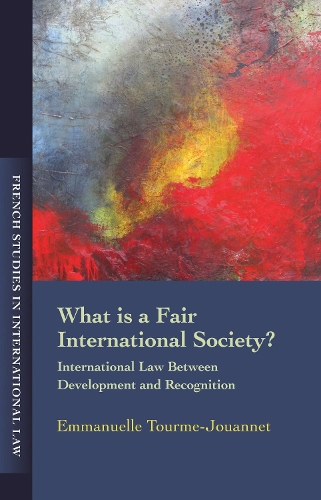
What is a Fair International Society: International Law Between Development and Recognition
(Paperback)
Publishing Details
What is a Fair International Society: International Law Between Development and Recognition
By (Author) Emmanuelle Tourme Jouannet
Bloomsbury Publishing PLC
Hart Publishing
14th August 2013
United Kingdom
Classifications
Professional and Scholarly
Non Fiction
341
Physical Properties
Paperback
252
Width 154mm, Height 232mm, Spine 16mm
400g
Description
Today's world is post-colonial and post-Cold War. These twin characteristics explain why international society is also riddled with the two major forms of injustice which Nancy Fraser identified as afflicting national societies. First, the economic and social disparities between states caused outcry in the 1950s when the first steps were taken towards decolonisation. These inequalities, to which a number of emerging states now contribute, are still glaring and still pose the problem of the gap between formal equality and true equality. Second, international society is increasingly confronted with culture- and identity-related claims, stretching the dividing line between equality and difference. The less-favoured states, those that feel stigmatised, but also native peoples, ethnic groups, minorities and women now aspire to both legal recognition of their equal dignity and the protection of their identities and cultures. Some even seek reparation for injustices arising from the past violation of their identities and the confiscation of their property or land. In answer to these two forms of claim, the subjects of international society have come up with two types of remedy encapsulated in legal rules: the law of development and the law of recognition. These two sets of rights are neither wholly autonomous and individualised branches of law nor formalised sets of rules. They are imperfect and have their dark side. Yet they can be seen as the first milestones towards what might become a fairer international society; one that is both equitable (as an answer to socio-economic injustice) and decent (as an answer to cultural injustice). This book explores this evolution in international society, setting it in historical perspective and examining its presuppositions and implications.
Reviews
a sophisticated and thought-provoking piece of international legal scholarship. -- Lorenzo Gradoni * Italian Yearbook of International Law, Volume 23, 2013 *
through its skilful interweaving of the international law of development and the international law of recognition. Tourme-Jouannet takes seemingly disparate fields of international law2 regarding economic relations between states on the one hand, and questions of culture and identity on the otherand brings them together through a wonderfully rich historical account of the postcolonial and post-Cold War worldSuch a project inevitably implies covering a sweeping breadth of issues, and it is one of the highlights of this book that it is likely to resonate with international lawyers from varied disciplines and geographies. -- Dhvani Mehta * Australian Yearbook of International Law *
Author Bio
Emmanuelle Tourme-Jouannet is now Professor at Sciences Po Law School, Paris. Her main publications include Le droit international (Paris, PUF, Collection 'Que sais-je ', 2013) The Liberal-Welfarist Law of Nations. A History of International Law (Cambridge University Press, 2012) and Emer de Vattel et l'mergence doctrinale du droit international classique (Paris, Pedone, 1998).
